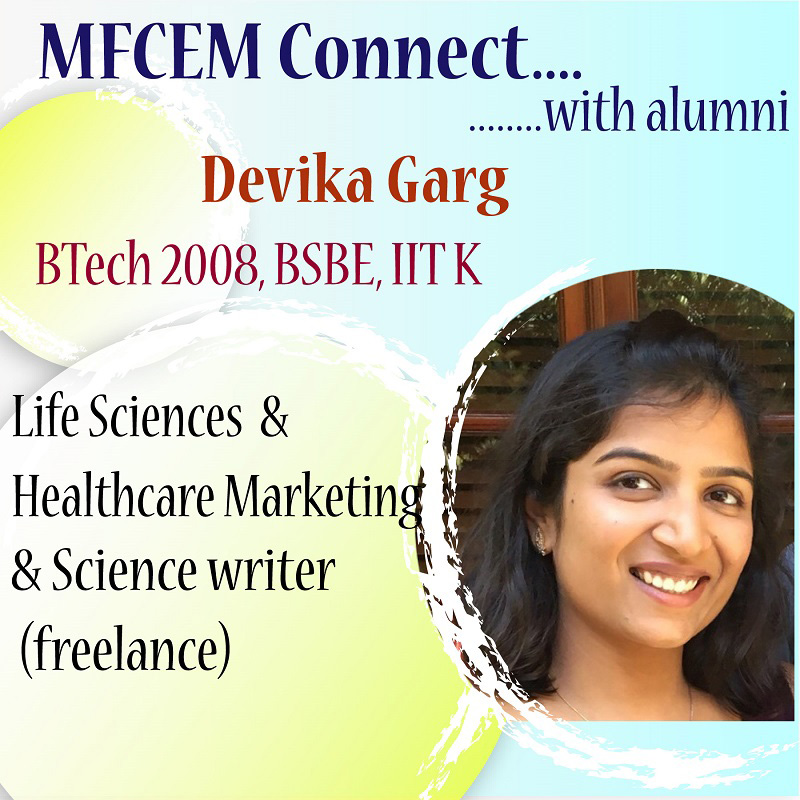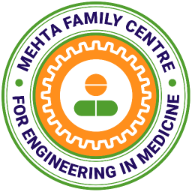
Devika Garg
[BTech-2008, BSBE, IIT Kanpur]
Life Sciences & Healthcare Marketing || GTM strategy || Freelance Science writer
MFCEM: Hi Devika! wonderful to connect. From being an undergrad at IIT Kanpur to providing a GTM (Go-To-Market) strategy for the Life Sciences industry—did it require a leap of faith, or was it a natural progression?
I strongly believe that you have to really connect with your career choices and in many ways, they have to come from a place of ownership.
Thank you for the opportunity to share! I would say both—there have been many leaps of faith, and yet the story still feels like a natural progression when you look back. My career has been a journey of introspection and saying yes to lucky chances. When I finished my undergrad, I wasn’t really ready to leave school and had a drive to dive deep into the process of scientific discovery. I went to graduate school for my PhD and that’s where I came across a wide variety of career options. Even as I continued research, I was always drawn toward science communication.
I chose to pursue that as a career and spent close to 4 years doing science journalism and freelance science writing — sharing complex scientific discoveries with non-scientists in creative ways. I played with different media—podcasts, videos—in addition to good ol’ articles. I began hunting for other forms of content where storytelling becomes important and discovered EdTech to be one such area. I delved into the world of content strategy and development as it applies to telling STEM stories for education, this time in the corporate world at a leading Fortune 500 semiconductor company. It brought me lots of great experience, however I felt I needed to get out of my comfort zone yet again to find the perfect fit.
I strongly believe that you have to really connect with your career choices and in many ways, they have to come from a place of ownership. Unless you introspect to learn about what makes you tick, it’s hard to land on the right path. My realization came from a place that I needed to be in a fast-paced environment, where I could contribute creatively, but also utilize my strong research and life sciences skills. Marketing and GTM Strategy for Life Sciences became a natural fit because it allowed me to stay close to my domain expertise as well as practice my research and creative crafts. I worked at a couple of startups in this area, before joining Pure Storage where I lead vertical GTM strategy and content marketing.
MFCEM: You were also associated with the online education platform “edX” a brainchild of another IITian. Do you think there is still a huge opportunity for innovative thinkers in this space?
I see lots of potential in AI helpers that guide students solving a problem instead of giving them an answer….. And then think about children and students with special needs….. There is potential to redesign learning in ways that it works for
I’m a fan of EdTech. Softwares designed for learning and education at every level have burgeoned over the past decade, but EdTech has really become central during the pandemic. What do you do when you can’t go to school or university? The learning has to happen wherever you are. That said, however, I do believe that online learning cannot fully replace immersive classroom experiences.
Technology can be a useful aid in flipped classrooms, for example, and technology can help customize the learning journey for every student to meet them where they are in their understanding. I see lots of potential in AI helpers that guide students solving a problem instead of giving them an answer; that can quickly multiply the impact of one human teacher in the classroom. An EdTech experience could also connect students in a classroom with actual world problems and help them solve those as bite-sized projects. And then think about children and students with special needs—our entire education system is designed for the needs of the many. There is potential to redesign learning in ways that it works for everyone. So even though this area appears somewhat saturated, I do believe there’s a lot of opportunity for anyone wanting to look deeper.
MFCEM: You seem to have invested in honing your skill sets in scientific writing, taking up courses from Stanford and UC Berkeley. You also write for The Scientist and The Genome Magazine. How gratifying is it to de-construct complex scientific ideas for a non-science audience?
I really enjoy making science accessible to everyone, because if you think about it, that’s where we all start our journey into science. Our science books are all designed in a way to draw non-science audiences into understanding the elegant and often complex ideas of the world around us. Breaking down a research paper into its bare parts is harder than it may seem and uses a lot of nuance and research to do it right. For me, I realized I didn’t have the patience to publish scientific papers that take really long cycles, but popular science articles need a lot of knowledge and creativity and get done quicker. That speed combined with the skill it takes has been very gratifying for me.
Even though I haven’t been directly involved in science communication of late, science has literally been the mainstay throughout the pandemic, and I often joke that the SARS-CoV-2 virus is perhaps the most hated science teacher in the world. This has been a time of great learning through many science communicators explaining about the biology of the virus itself, our immune systems and how vaccines work, mRNA-based vaccines, genetic variants, public health and population health in general. Keeping science communication alive is a fundamental part of how we create wonder and interest in young minds and others alike.
MFCEM: For all the youngsters just starting on their career, what would your advice be?
…whenever you’re faced with a choice, put it into context of the next 5-10 years and assess how that will fit into your long-term goal while still serving your immediate needs….
It’s so important to be open to opportunities and also open to listening to yourself. Life beyond undergrad is an open field where there are no time-bound exams and no one looking over your shoulder. So being self-motivated really counts. And that can only come from knowing what makes you tick. For example, are you comfortable taking risks, or does not knowing the plan for the next two months send you into a tizzy?
If it’s the latter, then entrepreneurship might not be for you. Are you a people person or more comfortable drawing energy from immersing yourself in reading or building code? And often figuring out a lot of this happens over time with experience. So be open and understand it’s a long road. While you’re young, optimize for the long run instead of just the next year. What that means is whenever you’re faced with a choice, put it into context of the next 5-10 years and assess how that will fit into your long-term goal while still serving your immediate needs. I’ve followed my heart throughout—whether it was choosing my major, or making significant career shifts from research into marketing, all of that has added up as wonderful life experience. Don’t get stuck in ideas that this is what a job after undergrad should look like, or that if you go to grad school, you must necessarily go down the academic route. Follow your interests deeply and stay creative about your career options; I’m sure that’ll lead you down the right pursuit.

